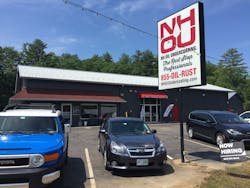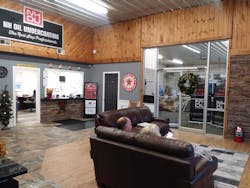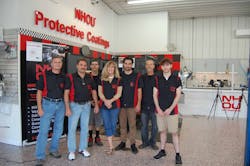NH Oil Undercoatings provides corrosion protection for New England customers
The New England nor’easter: a quaint colloquialism for terrible winter storms coming off the Atlantic. According to New Hampshire native Joe Dupont, however, most Granite State winters are pretty much the same as the rest of the North. Same amount of snowfall, same amount of salt used on the roads, thus same amount of rust.
From my own memories of when I was a kid in Michigan, it wasn’t unusual for a family to have at least two cars: one you drove in the summer and a rust-bucket ‘beater for the winter. Engines would frequently outlast bodies, because back then automakers did little to protect a vehicle’s sheetmetal, which created a whole undercoating aftermarket.
|
At a Glance: NH Oil Undercoating Inc. |
|
Joe Dupont Owner |
|
Chichester, NH Main location |
|
10 Years in business |
|
8 No. of employees |
|
6 No. of bays per shop |
|
57 No. of customer vehicles per week |
Over the years automakers have improved corrosion protection, but consumers like Dupont were still finding that rust can’t be eliminated entirely. “I had bought a new truck, a 2006 Ford F-250,” he recalls. “Plus I bought a diesel because I wanted to extend the mileage a little bit. But after five or six years I really noticed the rust was taking hold.”
Some of this can be traced to a change in de-icing technology, with salt brine having replaced road salt in many areas. While the liquid form of brine allows it to work better at melting ice in lower temperatures, a study conducted by Volkswagen found it tends to stick to undercarriages. Dupont also cites the use of thinner metals, creating “the perfect storm for [the undercoating] industry to be revived.”
Hoping to keep his own truck for a long time—“I bought two condos for what I paid for that F-250,” jokes Dupont—he turned to neighbors who were spraying their work vehicles with used motor oil. This turned out to be terribly messy, so he began looking for an alternative. Having built a business on re-facing kitchen cabinets, Dupont—no relation to chemical giant DuPont (as far as he knows)—began doing research on petrochemicals as rust preventives.
“I had to educate myself,” he remarks. “I’m at a point now where I can sit down with corrosion engineers and chemists and speak on somewhat of a basic level with them; I understand how you measure surface tension in fluids, sag, etc.”
Dupont was ready to put what he learned to the test. As it happened, he owned a piece of property near his house with a garage, and his son suggested they spray vehicles in it. That was all the impetus Joe needed to start a new enterprise.
“[Joe, Jr.] didn’t seem real interested in the cabinet business, but he was in this,” says Dupont. “So we found a product that was more environmentally friendly, designed more for the application, and we began to offer it to our friends and neighbors.”
NH Oil Undercoatings was incorporated shortly thereafter in 2010. Graduating from the small garage on a dirt road, they rented a facility in a business park –“a step up, but not by much”—and pickup trucks became their primary market. Ever the perfectionist, Dupont continued to tinker with application techniques and the product’s formula.
“I hooked up with a chemist with 40 years’ experience in chemical coating for the automobile industry,” Dupont reveals. “In the beginning he worked with me on tweaking it to get it where I wanted it; it took a long time for me to develop the original formula.”
But their partnership flourished and other products followed: a rust converter to work in conjunction with their oil; a black oil version of their primary product to hide rust damage; a semi-permanent, non-tacky wax and oil to help preserve new vehicles; Mouse Out, a coating laced with menthol to discourage vermin from nesting in stored RVs and boats; Salt Brine Eliminator, to clean off road residue; and finally a couple products to help preserve painted surfaces.
“I’m not motivated by the money,” says Dupont. “I’m not going to deny I like money—it’s like oxygen—but it’s not the driving force behind what we do. In developing other products, I just think it’s cool to solve a problem.”
Meanwhile, demand for their products and services grew—into something else. “We almost double our business every year,” Dupont estimates. “It started with us offering the service, but it evolved into us selling the service.
“When I originally had these products developed, I didn’t put them on the market for a while because they didn’t perform to my expectations,” explains Dupont. “Plus my wife and son were completely against me selling these products to our competitors. But then about 6-7 years ago we started to sell them.”
Working with Canadian and Massachusetts manufacturers, they now distribute their products and service package to over 400 garages in the U.S., with 400 more auto retail stores selling just the products. “We’re also in Canada, all of the European Union, and Russia,” Dupont proclaims.
Meanwhile NH Oil Undercoatings bought a bigger facility in Chichester: two buildings, each over 5000 square feet. The six-bay in the back has the spray booths and shipping center, the front one serves as the company’s customer service center/headquarters.
Besides the comfortable waiting area, where customers can watch their vehicles getting sprayed next door on closed circuit TV, the rest of the shop boasts a combination inspection area, training center, TV studio—and laboratory.
“I have a small lab set up at the shop so I could play with the formula myself,” says Dupont. “I have enough knowledge that I can try different corrosion inhibitors in a salt fog testing cabinet. When I get something that I think works, I give it to my chemist and let him do expert testing on it.
“The way that I find solutions is being closest to the problem,” he explains. “That’s how we developed all of our products, and how we got them to perform well, easy to apply. It’s one thing to develop a product, it’s another thing to use the product. So when my dealers get the product, it’s turnkey.”
And let’s not overlook the small TV studio, where Dupont produces You Tube videos. “My objective was simply to preemptively answer questions that were asked every single day,” he says of his on-camera work. “My wife—well, everyone in this industry—spends about 75% of their day answering the same questions over and over. So I decided to put out a couple of videos to see if it helped. Now my wife says that about 80% of the people calling know what they want; they’ve already watched the videos.”
He also sponsors and appears in segments for cable networks programs like Motorhead Garage and Sam’s Garage. While Dupont doesn’t solicit dealers, he showcases the company’s strengths through these various mediums. “We’re the model, a proven concept,” he notes. To that end, the company is working on the next step: setting itself up as a franchise, with different levels available to franchisees.
“We do a $1 million a year at that shop,” Dupont explains. “We’re putting ourselves out in front of people, presented as a professional, well-oiled machine. They can benefit from our research, our trials and errors, our marketing strategies. When most people become our dealers, they’ll do their research and say ‘you guys have your act together, and we want to be a part of that success.’”
About the Author
Robert Bravender
Robert Bravender graduated from the University of Memphis (TN) with a bachelor's degree in film and video production. Now working at Masters TV, he produces Motorhead Garage with longtime how-to guys Sam Memmolo and Dave Bowman. Bravender has edited a magazine for the National Muscle Car Association, a member-based race organization, which in turn lead to producing TV shows for ESPN, the Outdoor Life Network and Speedvision. He has produced shows ranging from the Mothers Polish Car Show Series to sport compact racing to Street Rodder TV.




